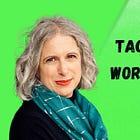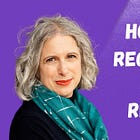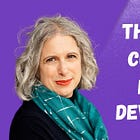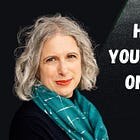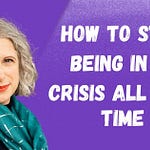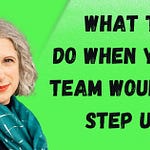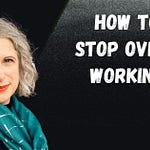Welcome to a free edition of Start Up To Grown Up: Your source for ideas, insights and tactics to take back control of your business and scale it sustainably and profitably by Heather Townsend, award-winning author of The Accountants’ Millionaires’ Club and Founder of The Accountants’ Growth Club
Running a professional services business such as a coaching, consulting, accountancy or legal business means that you will turn to networking. After all, when you sell a high value, high risk service a facebook ad or leaflet through the door isn’t going to be an effective route to market.
When you think of networking, what comes to mind? It is almost definitely a large, noisy room with many people. For many people - introverts or otherwise - the thought of this fills them with dread. Given my current sensitivity to noise (thank you Fibromyalgia) I can feel my heart rate creeping up at just the thought of needing to be in a busy room with lots of people.
If you are in this group, you are not alone. Many talented business winners would prefer to have their teeth taken out without local anaesthetic than regularly attend events to “network”. But the fact remains that the second easiest way to win business is to network. The first way? Winning business from your existing clients.
The rest of the article are my tips (worked out the hard way) on how to use networking to win business as an expert for hire. Without losing your sanity or marbles by feeling like you have to speak to everyone in a noisy and crowded room.
Networking tip: Do it your way
I’ll let you into a secret. I am an introvert AND wrote the Financial Times Guide To Business Networking. It was my first business book that I wrote. Funnily enough, I was found by the commissioning editor because I had used social media and content marketing to grow my profile. Yes, you did read that correctly. My commissioning editor approached me, not the other way around.
But I hate what most people think of as ‘networking’. I.e. the going out, to meet strangers to hopefully win a bit of business. For me, it’s many reasons. Firstly, speaking to new people is exhausting. Don’t get me wrong, I’m not anti people or social anxious. But there is only so long before the polite small talk bores me and I think ‘what’s the point’.
Then there is the fact that a room full of people is noisy. Which in itself can be exhausting. I‘d hate to think how disorientating and energy sapping this would be for anyone with a noise sensitivity or neurodivergent. For example, my son is dyslexic and has very poor auditory working memory. Which means in plain english that he struggles to keep up with a conversation that isn’t 1:2:1. I.e. when multiple conversations are happening across a small group.
The good news is that you can network your way. If you don’t like working the room, then you don’t have to work the room. It really is that simple. Just because it works for others to go out to win business by meeting lots of strangers doesn’t mean you need to do that, too. At the time of writing this article we are now 5 years on from Covid. There is definitely here in UK a sense that it is time to get back in the room. The networking in person groups and events are seeing a resurgence. But once again, that doesn’t mean you need to be there!
I remember when I was early into my business owner life and did go out to the local networking groups. I have nothing personal against those who buy into a multi-level marketing business model, but sellers of Utilities, skin creams and potions and whatnot are not my target market. I found that much of my local networking scene was not my ideal client or even my ideal introducer to my ideal clients.
A good way of challenging whether the event or group is a good use of your time is to consider your charge out rate. You know, the figure you have in your head when you are budgeting for a piece of work. When you add up the amount of time to prep for the event, travel and attend the event and then follow up after the event, is this a good use of your time compared to your charge out rate? For example, my team like to charge me out at over £3000 per day. As a result, unless I can pick up at least 2 or 3 pieces of client work or a programme of work within 12 months of being at the event or group there is no point in me being there.
I wrote this in the book The Financial Times Guide To Business Networking:
Effective business networking is the process of finding, building and maintaining mutually beneficial relationships.
Nowhere in this definition is the need to put yourself through endless amounts of agony by eating poorly cooked breakfasts or spending evenings in the company of strangers.
As long as your networking strategy, I.e. your plan to win work via your network, has actions to find, build and maintain the right relationships, it doesn’t matter how you go about the actual networking.
The many different ways of networking
Here are some ways of doing ‘networking’ without having to enter a crowded room full of strangers:
Use Substack, LinkedIn (or other social media platforms) to find people who you really want to meet
Having a phone call, lunch or coffee with a friend or good contact
The small regular networking group that meets to help each other find referrals
Having a hobby or an interest which you do with others, e.g. playing tennis, going hiking
Attending a friend's wedding
Have a regular contact strategy to stay in touch with your clients, particularly when they move jobs or start new businesses.
In fact, the most recent referral I gave was to an accountant in The Accountants Growth Club. I was speaking with a supplier for Facebook Ads. We’d not worked with them for a while as we’d stopped doing facebook ads. In the conversation they begged me (and this isn’t an exaggeration) for a referral to an accountant to help them sort out their messy books and stuff that they were late in filing. 2 weeks later I have a happy supplier and a happy client.
This is not an unusual occurrence for me. I probably make 2-4 referrals to accountants and lawyers every month as people know I have an amazing network of lawyers and accountants.
Networking tip: Manage your energy levels
This is very topical for me right now. I literally have to pace myself and manage my energy levels. And being around people, particularly those I don’t know is exhausting.
However, I still love the company of others. Just in small doses and on my terms! Just because I am an introvert doesn’t mean to say I am anti-social or socially inept. It just means that I re-energise when on my own. It will be the same for you if you see yourself as an introvert. As a result, when I find myself at an event where ‘networking’ is expected, e.g. at the recent Accounting Excellence Awards, I carefully manage my energy levels. When I start to feel tired, or the fun starts to wane, that’s the point I up and leave.
Given where my health is right now, I am declining most invites to meet people in person or be at an evening event. Funnily enough, my business has never been stronger. But this is because I have done 15+ years of profile and tribe building, with 6 business books to my name and a strong personal brand in the market. Without this foundation behind me I would need to be spending more time ‘out there’.
Networking tip: Have a goal for your networking activity
Like any type of marketing, the spray-and-pray method of networking is ineffective.
If you will get the results you want from your networking, you need it to be “on purpose”. This means every time I am doing a networking-type activity, whether it’s posting on LinkedIn, attending an industry event or asking for a phone call with a contact, I know the purpose of my activity. For example, if you find yourself at an event where you are required to network, then decide on your goal for the event.
Who do you want to talk to? How many good-quality conversations do you want to have?
Then, when you have achieved your goal, you can leave if you want to.
Networking tip: Ditch your wingman or wingwoman
When we were young, our parents, teachers and people in authority always told us to never talk to strangers. So, is it any wonder that we find it hard when we are told we need to talk to strangers for the good of our career or business?
I know that when I am at these big events, I feel a pull to stick with the people I know well, which is fine up to a point. But by sticking to my wingmen or wingwomen, I miss out on the opportunities in the room. If you can relate to this, I suggest having your first safe conversation with your wingman or wingwoman and then deliberately split up to circulate.
Networking tip: Reclaim your introverted superpowers.
Labelling yourself as an introvert regarding business development can be unhelpful. In fact any kind of label which implies you can’t do something is unhelpful.
The myth is that the best networkers and relationship builders are the out-and-out extroverts. You know, those who are great at seemingly talking to people. In my experience, many of the superpowers that come from being introverts make us excellent relationship builders. Those superpowers? Our abilities to truly listen to someone, to notice who they really are and the fact we rarely interrupt or talk over another person.
Just this week one of my team, a lady I respect immensely and a former Big 4 partner, said to me that my superpower was to be able to read or hear a conversation and then summarise it succinctly so the key points were heard and understood. You can’t do that if you are the one doing the most amount of speaking in a conversation.
Networking tip: Use online networking to help you find the right people
When I was early into my business owner journey I had 2 toddlers and a husband who worked shifts. The issue was that he was often required to work overtime at little or no notice. That meant I always needed to plan a babysitter or childcare if I wanted to get out to meet people. That meant any kind of networking in person had to be carefully organised. When you also add in the cost of the event, getting to the event and childcare, it became a considered undertaking. After all, my redundancy money didn’t stretch that far!
This meant that social media, even though it was in its infancy, was a lifeline to me as a new business owner. After all before social media, we were forced to invest in directories and attend networking events to find the right people to add to our network.
Whether you love or hate social media, particularly LinkedIn, is that it speeds up finding the right people. LinkedIn is searchable by location, job title and keywords. All of these can make starting a conversation with the right person much easier. As the relationship forms on social media, it is much easier to have a phone call or in-person meeting. This is because the tough stage of getting a conversation started and getting to know a stranger has already been done.
In summary
Remember when it comes to effective business networking it is the process of finding, building and maintaining mutually beneficial relationships. It is not ‘going out to events’, ‘working a room’ or any other torture that you decide to impose on yourself.
What you do need to do is build your network and tribe in a way which works for your circumstances and energy levels.
Your action this week
Identify who in your network is a good introducer and how to find and build more relationships with people like them.



